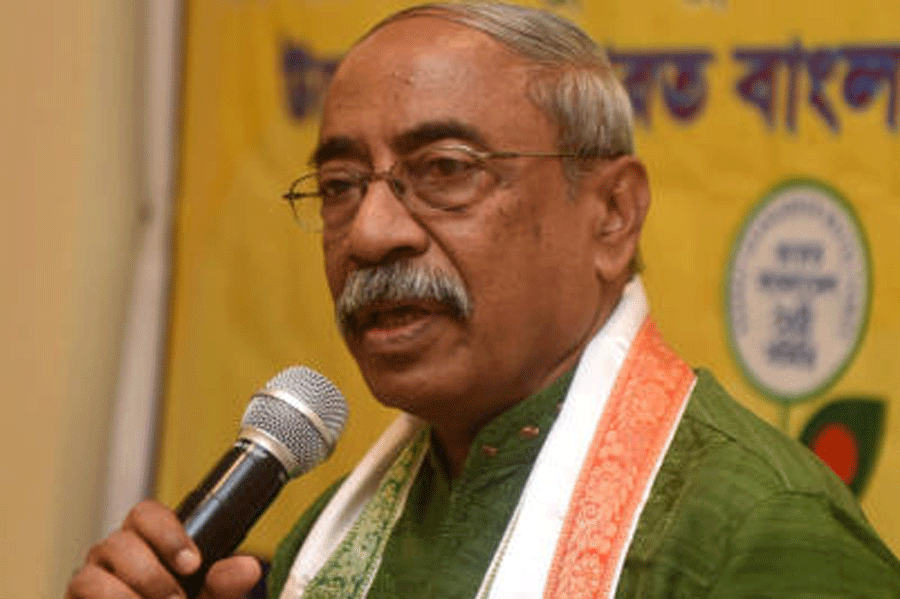The parliamentary elections are due early next year and Bangladesh is roiling. The chief actors are the ruling Awami League, the Bangladesh Nationalist Party (BNP), the Jamaat-e-Islami and Uncle Sam. In the news — protests and rallies against the incumbent Sheikh Hasina-led government eyeing a fourth consecutive term in office, arrests of Opposition leaders and supporters, and the ensuing violence. In September, an over-anxious US State Department announced the imposition of visa restrictions on “Bangladeshi individuals responsible for, or complicit in, undermining the democratic election process in Bangladesh” and in November, the sudden departure of US Ambassador to Bangladesh Peter Haas for a “short vacation” caused a flutter. Against this political backdrop, Subhoranjan Dasgupta chats with Bangladeshi human rights activist Shahriar Kabir. Here are the excerpts.
Q The BNP is sustaining its agitation, turning violent at times. To what extent have the people of Bangladesh responded to their programme?
The agitation launched by the BNP in the first phase was more or less peaceful. The people also responded to a certain extent...
But since October 28, the BNP-Jamaat’s anti-government movement turned violent — a constable was butchered, journalists were severely assaulted, the residence of the Chief Justice was attacked, many buses and other vehicles were set on fire and a couple of helpers of buses were burnt to death. Above all, the blockade of rail and road and the days of hartal adversely impacted business, daily wage earners and peasants in particular who supply vegetables to towns and cities. I fear rallies, blockades and hartals will conti- nue till the elections. The people, however, are tired, even disgusted, by this continuing unrest and they are not simply responding. In other words, the support to the BNP’s anti-government movement has completely subsided.
Q Will the ruling Awami League succumb to pressure?
The ruling power has categorically said that no caretaker government will be installed under any circumstances to conduct the elections. Earlier, the ruling party invited the BNP to talks and consultations but this appeal has been ignored. Sections of the BNP, however, have come out of the BNP fold to contest elections on their own.
Q What is the latest political position of the Jamaat-e-Islami, the electoral ally of the BNP, which has been labelled a “moderate Islamic party” by the US?
First, the Jamaat, funded by the ISI, is egging on the BNP. Second, the high court has banned the Jamaat from contesting elections. It has appealed to the Supreme Court but the verdict is awaited. You see, the politics of Jamaat, even its very Constitution, is totally opposite to the secular, democratic Constitution of the country. Its guidebook is the Quran, which is of course acceptable as a religious holy text, but that cannot be the basis of modern governance. Further, its Weltanschauung is thoroughly anti-women and anti- minority. It is not at all a “moderate Islamic party” as the US administration labels it. It is a rabid fundamentalist party whose past is nefarious and condemnable. It collaborated with the killing army of Yahya Khan in 1971 and took part in the genocide of the Bengalis. Even now it acts in close concert with the ISI. It will contest elections in an indirect or covert way as before, that is, support “independent” candidates nominated by them.
Q How would you evaluate the political position of the Jatiya Party, which functions as the main Opposition in the absence of the BNP, and Leftist parties such as the Bangladesh Communist Party and the Workers Party of Bangladesh?
The Jatiya Party has to settle its own internal tussle. In any case, they are putting up candidates in most constituencies. The Left, which had functioned in the past as partners of the coalition led by the Awami League, however, seems to have shifted gear. It has inched closer to the BNP. I find this inexplicable. How can the “secular” Left inch close to a political formation that works in concert with the Jamaat? Indeed, some Left politicians have been attending rallies and meetings organised by the BNP and other Islamic parties. When journalists ask them why, they fail to give a convincing reply.
Q Why has the US been taking such an excessive interest in Bangladesh?
The policy and attitude of the US administration towards Bangladesh have been flawed since the very beginning. It supported the murderous military regime of Pakistan during the Liberation War. During that phase, the American Consul General of Dhaka, Archer Blood, repeatedly stressed in his reports the blunder that the State Department was committing. Not only was he ignored but also cornered by Henry Kissinger and his aides. We, on our part, have made all possible efforts to influence American Congressmen and tell them that their State Department’s “moderate” Jamaat is, in actuality, a Bangladeshi version of the Taliban... The US government faces no problem dealing with a thoroughly royalist dispensation like Saudi Arabia, which hacks off limbs as punishment. It had all along supported the military regime of Pakistan since 1947 as a valued ally. It prompted the bloody military takeover of Chile in 1973 by General Pinochet — the Leftist democrat Salvador Allende died fighting. It departed from Afghanistan in the most casual, careless manner... It carpet-bombed Iraq falsely claiming that Iraq has a secret store of nuclear weapons. In short, its record as the protector of democracy and human rights is shocking and inglorious. But now the same country is tearing its hair over Bangladesh. The truth lies elsewhere. White House is against the functioning of national, secular governments in the developing world which are trying to follow independent foreign policies. The present Bangladesh government nurtures a special relationship of amity with India, invites China to undertake bilateral economic projects, while Russia is helping us build our nuclear power plant. Prime Minister Sheikh Hasina has told the Americans that we cannot allow them to set up any deep sea port or naval base in the Bay of Bengal. I think this concept and practice of sovereignty irks the strongest nation of the world used to gestures of subservience. The US government always prefers puppet regimes in the developing world and elsewhere.
Q New Delhi, on its part, has explicitly stated its preference for the Awami League to the US government. Has this had any effect?
We are grateful to the Indian government for its supportive role since 1971. I think this should have some impact. The reasons for India’s preference are crystal clear. Tell me, how can New Delhi forget the troubled past when the BNP and the Jamaat coalition government actively encouraged and assisted the insurgency movement in the northeastern states of India? At that point in time, no fewer than 160 military training camps were active in Bangladesh and the leaders of the secessionist movements were treated as guests and freedom fighters. The Awami League government, after coming to power in 1996, rooted out such insurgency and handed over those secessionist leaders to the Indian government. The minority community also had to face a lot of harassment, even persecution, during the BNP-Jamaat regime. Expectedly, India would hate to see the BNP-Jamaat, supported by the ISI, wrest power in Bangladesh. New Delhi has told Washington in unambiguous terms that the present dispensation is indispensable for the progress and stability of the entire region.
Q India’s defeat at the cricket World Cup final is said to have been greeted fulsomely in Bangladesh. Is the common perception in Bangladesh opposed to India?
Indeed, there are pro-Pakistan elements in our politics and society. These anti-liberation Islamists supported Pakistan during the Liberation War of Bangladesh. Their political and ideological successors are still active, and are trying to re-establish the Pakistani concept in the politics, culture and society of Bangladesh. Its reflection in sports is also quite visible. We have seen in the past how Bangladeshis are supporting Pakistan against India in cricket matches. This is nothing new. But the majority of sports spectators in Bangladesh love good cricket and support India.










